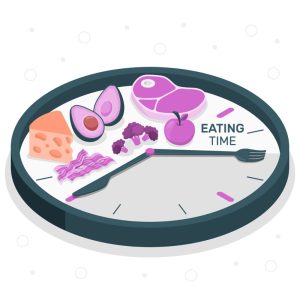 We welcome Eleazar Torres to our latest edition of Nutrition Stories, our series exploring hot topics in nutrition and dietetics. Eleazar is a graduate of the UF Didactic Program in Dietetics (DPD) in the Food Science and Human Nutrition (FSHN) Department and a student in the Master of Science-Dietetic Internship (MS-DI) program at The University of Florida. His interest in the pros and cons of intermittent fasting is reflected in this engaging article that seeks to answer the question: is intermittent fasting worth the hype?
We welcome Eleazar Torres to our latest edition of Nutrition Stories, our series exploring hot topics in nutrition and dietetics. Eleazar is a graduate of the UF Didactic Program in Dietetics (DPD) in the Food Science and Human Nutrition (FSHN) Department and a student in the Master of Science-Dietetic Internship (MS-DI) program at The University of Florida. His interest in the pros and cons of intermittent fasting is reflected in this engaging article that seeks to answer the question: is intermittent fasting worth the hype?
Eleazar: Imagine this: Josh is a 20-year-old college student who wants to get back in shape in time for summer. He’s busy with classes and other commitments and wants to find something easy and effective to incorporate into his daily routine. After browsing online and talking with some friends, he discovers intermittent fasting, a diet plan in which individuals heavily restrict their calorie intake for an extended time throughout the day. Even better, he heard that this diet could improve his overall health! Should he start fasting to lose weight?
Intermittent fasting caught my attention over recent years through its popularity on social media platforms, such as Instagram and TikTok. However, I wondered if fasting provides any beneficial long-term results and if there are any associated risks. In this article, we will dive into the intriguing realm of intermittent fasting, exploring its science-backed benefits and determine if it’s a trend that we should follow.

Intermittent Fasting and Our Health
Intermittent fasting is defined as a diet in which individuals consume calories within a certain daily timeframe. Time frames can vary by individuals or diet plans; however, one of the most popular plans is to eat during only four to eight hours each day. An extreme version of the plan advises consuming calories for only one hour each day!
Evidence suggests correlations between this diet and reduced body weight, waist circumference, and fat mass.1 In a recent meta-analysis, intermittent fasting was compared with other weight-loss diets such as a calorie-restricted diet. Researchers found that intermittent fasting produced the greatest weight reduction while preserving lean body mass.1 Similar effects are seen in people with metabolic conditions, such as type 2 diabetes or obesity. However, these groups complained more frequently of headaches, slight dizziness, fatigue, and bad mood.2

While fasting can help us lose weight, how does it affect our overall health? Researchers have found that this diet has a positive effect on insulin resistance and overall metabolic health.3 This result is mainly due to fat tissue stores becoming metabolized while fasting, causing insulin levels to improve in the long term. This process may be especially helpful to patients with diabetes and obesity, as the decrease in fat tissue stores can greatly improve their overall health and quality of life due to better blood sugar control, reduced reliance on medications, and improved cardiovascular health.
Connecting back with our friend Josh, intermittent fasting appears to provide positive results for our weight and health. Starting the diet plan seems like a simple and effective solution for Josh’s goals. Before we recommend that he start the fast, let’s explore some drawbacks.
Drawbacks to Intermittent Fasting

One of the major drawbacks to the diet is the risk of nutrient deficiencies.4 When fasting, you have a smaller daily window of time to consume all the essential minerals and vitamins. Fitting a day’s worth of nutrients into a few hours can be incredibly difficult, especially if you have a poor-quality diet prior to beginning the fast. In the long term, fasting can result in an increased risk for many conditions, including malnutrition and poor organ health.4 Rapid weight loss may also be seen; however, it’s important to note that rapid weight loss is unhealthy as it can lead to muscle loss and nutrient deficiencies.
Additionally, there is a correlation between intermittent fasting and disordered eating habits.5 In an observation study, researchers found that individuals who implemented this diet for an extended period have a greater likelihood of disordered eating. This correlation was strongest in young adults.
Knowing this information, Josh seems to be in quite a pickle! On one hand, intermittent fasting promises improved health and weight loss, but on the other, following this diet may increase risk of nutrient deficiencies and disordered eating. What should he do?

Should I Try Intermittent Fasting?
There is no direct answer on whether intermittent fasting should be followed or not. Instead, it depends on a wide variety of factors including personal goals, past medical history, and weight status. Because of these factors, avoid self-prescribing fasting as following this diet can lead to serious health consequences. Instead, discuss your health goals with a physician or registered dietitian nutritionist. Discussing diet possibilities with these healthcare professionals can help determine on whether the fast is appropriate for your specific needs. Additionally, if your team decides this diet is right for you, you can learn how to do the fast safely.
As for our friend Josh, he should visit the campus registered dietitian nutritionist or student healthcare center to seek nutritional advice. The insights provided by the healthcare team will play a pivotal role in shaping his final decision on whether to pursue intermittent fasting or explore alternative approaches for achieving his health and fitness goals.
Overall, intermittent fasting appears to serve as an effective way to promote weight and fat loss among a wide variety of individuals. Like any other diet, however, it should be viewed with caution to prevent any health complications. If you feel intermittent fasting will help achieve your personal health and wellness goals, speak with a physician or dietitian to determine whether this is the best option to pursue.

References
- Gu L, Fu R, Hong J, Ni H, Yu K, Lou H. Effects of Intermittent Fasting in Human Compared to a Non-intervention Diet and Caloric Restriction: A Meta-Analysis of Randomized Controlled Trials. Front Nutr. 2022;9:871682. Published 2022 May 2. doi:10.3389/fnut.2022.871682
- Morales-Suarez-Varela M, Collado Sánchez E, Peraita-Costa I, Llopis-Morales A, Soriano JM. Intermittent Fasting and the Possible Benefits in Obesity, Diabetes, and Multiple Sclerosis: A Systematic Review of Randomized Clinical Trials. Nutrients. 2021;13(9):3179. Published 2021 Sep 13. doi:10.3390/nu13093179
- Vasim I, Majeed CN, DeBoer MD. Intermittent Fasting and Metabolic Health. Nutrients. 2022;14(3):631. Published 2022 Jan 31. doi:10.3390/nu14030631
- Ganson KT, Cuccolo K, Hallward L, Nagata JM. Intermittent fasting: Describing engagement and associations with eating disorder behaviors and psychopathology among Canadian adolescents and young adults. Eat Behav. 2022;47:101681. doi:10.1016/j.eatbeh.2022.101681
- Collier R. Intermittent fasting: the next big weight loss fad. CMAJ. 2013;185(8):E321-E322. doi:10.1503/cmaj.109-4437
Header photo credit: UF/IFAS Photo by Tyler Jones.
Looking for more posts sharing stories about nutrition hot topics? Check out the rest of the UF/FSHN Nutrition Stories Series!
 5
5
